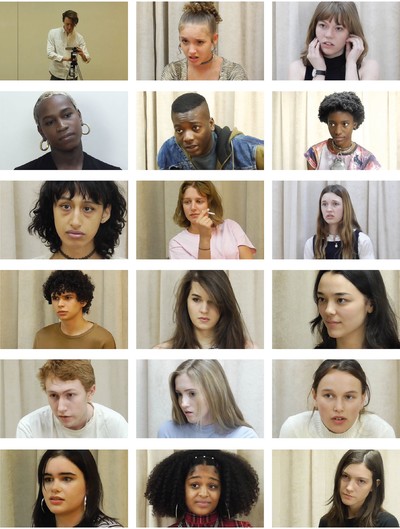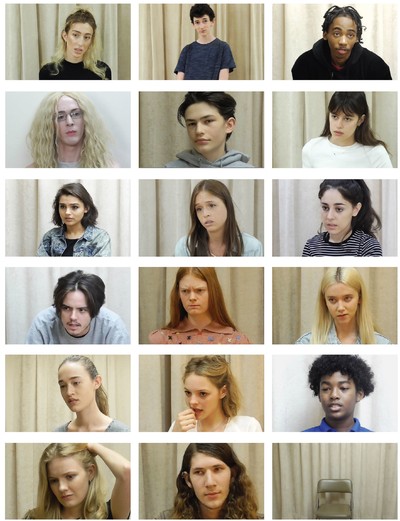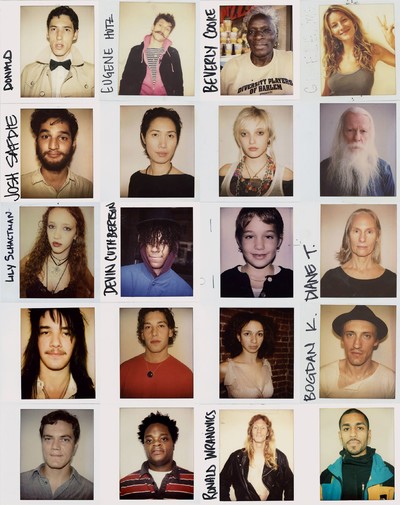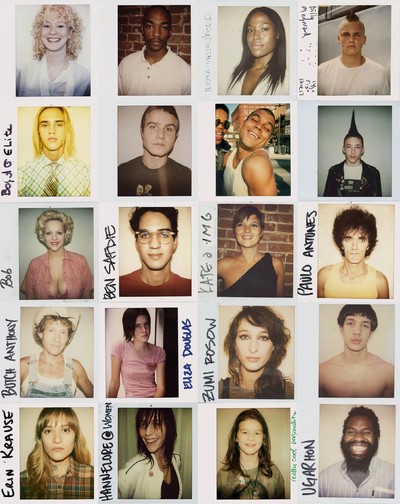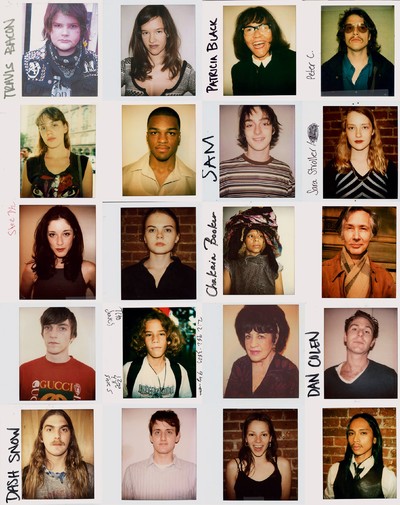By Sara McAlpine
Portrait by Peter Ash Lee
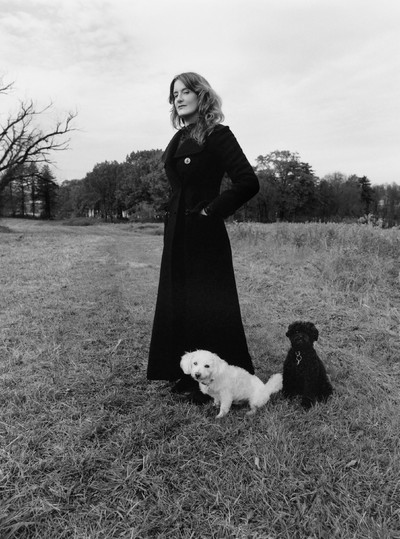
Casting director.
Jennifer Venditti doesn’t think of herself as a casting director, despite having over 20 years experience playing a hand in putting people in front of the camera – in fashion, TV, and film – and being responsible for the mix of talent in A24’s Euphoria, Uncut Gems, Good Time, and more. Venditti’s approach to casting might seem familiar now, seeing streetcast models fill the runways and campaigns of major fashion brands. But in 1998, when she began her career in fashion, eschewing conventional beauty standards with an emphasis on presence and character over, say, height, was atypical. As was her approach to finding the ‘right’ people. Film played a key role in Venditti’s process, recording video interviews with people that the ‘explorer’, as she describes herself, found having travelled to unexpected places with a handheld camera and immersing herself in communities to discover talent. Her interviews, Polaroids, and casting-call flyers are the subject of Can I Ask You A Question?, the A24-published book documenting her approach to casting the likes of Angus Cloud, an actor with no experience or training prior to appearing as Fezco in Euphoria, alongside established actors known worldwide. The shift in her 20-year career is significant, with social media playing a role in representation and access. But Venditti still applies an unorthodox approach to her pursuit of talent that has proven to make a lasting cultural impact.
How did your relationship with A24 start?
The first project that I worked on with them was American Honey. The director Andrea Arnold wanted it to be a less traditional process for narrative filmmaking, with more of an organic, documentary approach. That was definitely woven into the casting. I worked with many different scouts, and we really lived with many different communities for that casting process, which isn’t normal – certainly not for feature film, and definitely not for fashion at that time. Actually, for me, thinking about that, A24 was kind of the equivalent of W magazine for me, and working with its creative director Dennis Freedman. When I first started in fashion, it wasn’t normal to send someone all over the world and just say, ‘Here’s a theme, go find what you think would be right for that in terms of the people’, and then travel all over the world doing that. A24 is really supportive of the creative process and all the players that make that happen. Andrea Arnold wanted authenticity, which meant travelling all over, and they supported that with full creative autonomy. I didn’t realize at the time, but looking back, I know that isn’t the traditional approach elsewhere, but it is the standard with them.
What do you mean when you say ‘the traditional approach’?
Normally, you’d contact agencies and audition actors. You don’t go to random strip clubs and beaches in Florida to look for people. I had to create my own process and ways of seeing if those people could actually act.
So, it’s like the difference in fashion between going to a modelling agency and asking ‘who’s on your books?’ and streetcasting.
Oh, yes, you email all the modelling agencies, you tell them the details, they send you packages, you go through and edit, you schedule a casting, you see the people, you book the people. In movies, you send out a breakdown to agents and managers, they submit people, you pick them, you audition them, you then make an offer to someone if they have a body of work that you can already see. Just like in fashion, if someone’s famous enough that they don’t need to do a casting, you just book them. Yeah, so that would be the traditional way. With American Honey, it was just staying in an area and getting to know people and working with them. And then seeing what we could find and deciding if we were going to move on; picking certain parts of America and focusing on those.
‘You don’t normally go to random strip clubs and beaches in Florida to cast people. I had to create my own processes and ways of seeing.’
How did you go about finding people then?
We did an actual open call in real life. I really need time to know the place and get to know people. I have lots of different processes. I think, with that project, I sent an edited version of interviews of people I thought were interesting. Maybe some improv with them. It’s much more complicated than I’m saying. I do think, at the beginning, people had this misconception that you just find some people on the street, and it’s not like that. Even for fashion, not everyone can take a picture even if they have a beautiful face. It can be a very long process. I might need a month before I’m going to send a director anything. That project was really specific, and the world is very different now. At that time, there wasn’t Instagram.
You told the New York Times you don’t identify as a casting director. How do you see your role?
This is my constant dilemma, but I think I’m just an explorer of humanity. I don’t know. I’m not really like studying and commenting on it, but I do think I’m exploring it for myself and for the people who hire me. When I take a job, I wonder, ‘Who would this person be? What would they be like?’ And I don’t just look for non-actors. I cast tonnes of actors the traditional way as well. I’m not a purist in that I only do alternative casting. There can be a kind of magic between a non-actor and an actor too. Even in fashion – it sounds stupid to say, because it’s such a big thing now – when I started, the examples of beauty were very narrow and limited. I wanted to see more ideas of beauty, and that’s how I feel about cinema. Sometimes, with the representation of certain people, it doesn’t feel like I’m watching a movie. There’s something about having someone a little bit more authentic and raw that is exciting to me, because I want to see humanity reflected on the screen. I want to see examples of what it is to be human.
In terms of how that translates into a practical process, what is your process from start to finish?
Every project is different. The first thing is the script; sometimes there’s a book as well, sometimes there are articles, and then it’s a deep conversation. For American Honey, no one came to an office to audition. We planned a whole trip and brought people to a place where the environment was like a nondescript outdoor place, and I had a non-professional actor there who did improv with these people. So, we’d be on a sidewalk somewhere in Bushwick, filming them with handheld cameras. For Uncut Gems, it was similar. I made a list of the people from the script that I felt would be better served by someone who was more authentic; that would give something to the character that an actor wouldn’t.
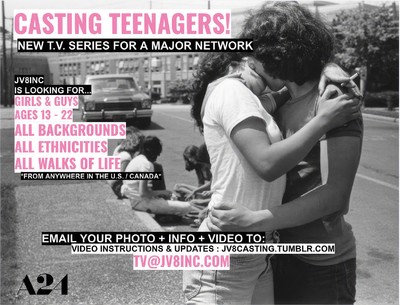
Original casting flyer for Euphoria season one, 2018.
You mentioned Instagram; does that play a role in the casting process too?
We didn’t use it for those two projects. Euphoria was the first one that we did that on. For both of those other projects, we did open calls as well. I swear to God, we thought so many people were gonna come; we put flyers everywhere. And, like, 50 people came. When we were doing Euphoria, we had an open call in a basement, and 20 people came. No one knew what it was. It made no sense. What I learned from Euphoria was that, for young people, it is way better to have an online open call than to do something in person.
Is that just because you’re looking for a demographic that spends a lot more time online?
Yeah. We used to scout all the time in malls; when we used to do fashion stuff, that was the place to go. But malls have been dead for a very long time. The culture is very different. So, when we did the open call for Euphoria, I was like, ‘This is such a bust.’ Barely anyone came. Then when we did season two, and we did an online open call, it was insane. Around 10,000 people submitted. It seems obvious, but it really opens it up. I just did another project for A24 called The Sympathizer, which was a very tall order of casting. It’s a predominantly Vietnamese cast, and they have to speak Vietnamese and English. So, we had to do a lot of online open calls. Again, that really opens it up; you’re so surprised by the ages and backgrounds that make it in front of you.
‘When we were casting for Euphoria, we put flyers out everywhere and had an open call in a basement, but only 20 people came. No one knew what it was.’
You’ve said video interviews are a big part of your casting process, even from your time working in fashion.
The reason I got into fashion was because I liked the story that clothing could tell about a person. I was asking everyone in fashion all these questions and interviewing them, and I felt limited, because I had a box of tapes that no one in the fashion industry cared about. They just wanted to see the Polaroid, but I was filming everyone as well. Even for still photos, someone has to have an energy about them. For me, they have to be comfortable moving. I’m approaching the casting process as if I’m making the film as well. That is how I understood if I could push someone and be like, ‘This person is magic.’
What kinds of questions do you ask?
If there are people scouting for me, I give them a list of general questions that revolve around the role; to see if the person has a connection to the character in some way. I couldn’t give you a list of the questions I ask, because it’s not rehearsed – it’s a conversation. But it’s a spiritual exchange for me; I’m reading a person, I’m feeling the room. [Filmmaker] Josh Safdie and a producer working with him said to me, ‘Oh my god, I could just watch a movie of these interviews.’ I wanted to do that long before the [A24] book; to make a documentary of the interviews.
It seems natural then to editorialize everything that you’ve built, documenting the process. But how did the book with A24 actually come about?
I always kept everything, but I thought that I was gonna have a gallery show of all my Polaroids or something. I’ve always dreamed of making a documentary; I never thought of a book. I was talking to producers and pitching it as a documentary, and we were trying to figure out the legality of using all those clips; the copyright and all that. Then A24 contacted me, because they were making the Euphoria book, and they asked me if I wanted to interview Angus [Cloud]. So, I did the interview with Angus, and they heard I had this material, and were like, ‘Wow, we should do a project.’ I still would like to do the film version.
How have you seen the culture of casting across industries change in the past 20 years?
It’s just so interesting to see the culture catch up. There’s more character with streetcasting modelling agencies, and I love the rebirth of Interview with Mel [Ottenberg], bringing so much life to the conversations in magazines again. There’s so much episodic documentary content. We live in a culture now where the idea of beauty has become a more diverse and expansive expression, and it’s beautiful to see we’re kind of living in the future that I saw 20 years ago. There are still people who are not being represented, and this kind of casting now gives us the opportunity to say, ‘Okay, we’re not just going to use someone who looks Vietnamese.’ We can actually go find authentic Vietnamese people, like we have with The Sympathizer, and I’m proud we never have to be like, ‘Well, we just can’t find this.’ We can, so let’s go. So, credit to A24 for giving me the autonomy and trust, and understanding that it takes time. This is happening in a studio system, and I have many other examples of me doing this work in the beginning of my career, where it’s like, ‘Well, how long is it going to take? We can’t afford that. We can’t do it like that.’
Does your experience in casting for fashion inform your casting for film and TV?
I do want to say that my experience in fashion has totally informed my casting work. With Euphoria, I knew Barbie [Ferreira] and Hunter [Schafer], because I had worked in fashion. I always send my breakdowns for films to all the modelling agencies too, because I believe there are so many incredibly interesting girls that never made it. They weren’t big models, but they were so cool and interesting, and film and TV might be another avenue for them. So, even if I’m not doing fashion stuff all the time, I am incorporating all my contacts, and all the stuff I know about the industry, and giving them an opportunity as well. One thing that really stood out for me too, in both, is that casting is rarely recognized. You know, the make-up has an Oscar, but casting isn’t even acknowledged as a category; that’s possibly because we’re not on set. But our job is the most important at the very beginning, even though once the filming starts, we’re no longer involved. I just feel so grateful that A24 sees it that way; that it felt worthy of a book. It’s hard to take a risk on anything, but they have given space to every creative at every stage. I went to a film festival recently and everyone was talking about the future of cinema and TV. Everyone was devastated, being very doomsday. But someone rightfully pointed out that A24 is getting new voices into cinema; not just on the screen, but in so many interesting ways. They’re getting people to go to the movie theatre, but also more. After Covid, everyone’s on the verge of being bankrupt. But A24 always stayed in their lane, and were so consistent with their own branding. It’s never inauthentic.
